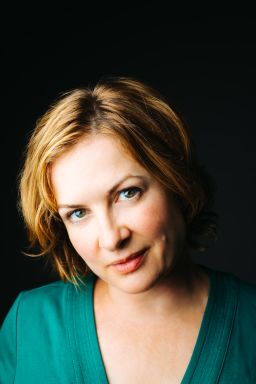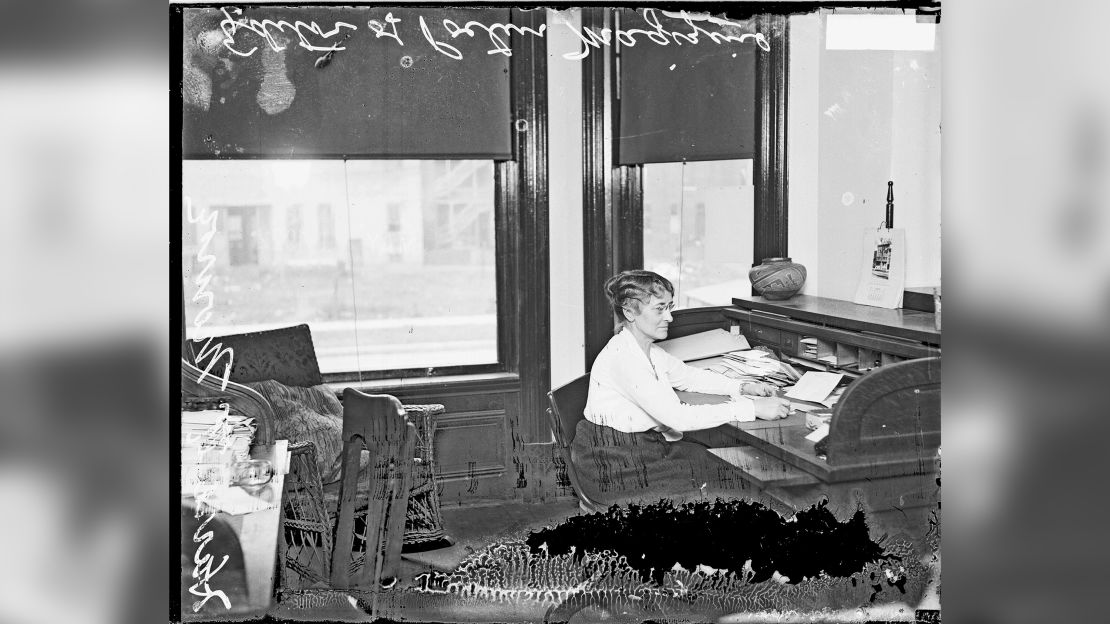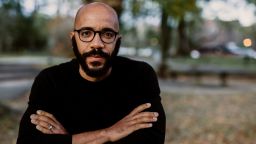Editor’s Note: Tess Taylor is the author of five collections of poetry, including Work & Days and Rift Zone. She is releasing the anthology Leaning Toward Light: Poems For Gardens and The Hands That Tend Them this coming August. The views expressed here are her own. Read more opinion on CNN.
Last year, Adrian Matejka took the helm of Poetry Magazine, a venerable magazine that turned 110 years old on his watch. Matejka, who was born in Germany as part of a military family and grew up in Indianapolis, Indiana, became the first Black person ever to edit the magazine. For National Poetry Month this year, he talked with Tess Taylor about rap, public service, writing a graphic novel – “Last On His Feet: Jack Johnson and the Battle of the Century,” – community gardening and building a big tent for art, as well as what it means to take over a storied literary institution and build it for the present.

This interview has been lightly edited and condensed for clarity.
Tess Taylor: How did you come to poetry?
Adrian Matejka: You know, I wanted to be a rapper, but I was terrible at it. No rhythm, no flow, so I gave it up. Then I heard Yusef Komunyakaa read. And when I heard him, I was just like, you gotta be kidding me. It sounded like making music. I knew I wanted to do what he was doing. I had no idea how hard it actually is to make a poem…. No idea. I just knew I wanted to engage. This was in Bloomington, Indiana, in college. I don’t think I’d even read a poem before then. And Yusef was doing a fundraiser for a coffee shop that he liked to write in. The only coffee shop in Bloomington at the time, Runcible Spoon. It’s still there. They have amazing blueberry pancakes. And this one day Yusef was in a corner with — you remember Mr. Microphone? The little speaker and amplifiers? Something like that, just in a corner. I had never heard anything like that. I hate to be dramatic about it. But I felt like my life changed when I heard him read.
Taylor: You’ve taken over a magazine that turned 110 years old and is deeply storied. What’s it like to step into that history?
Matejka: You know, it’s pretty heavy. When you think about 110 years, and I’m the first Black lead editor? There’s only been one woman as lead editor, Harriet Monroe, and she founded the magazine. In between, some of the most famous poets to walk the earth have appeared in the pages. On the one hand, we have this beautiful artistic history, part of the history of our art in America. On the other hand, we’ve got spaces, gaps and absences in that history that need to be attended to. I’m really proud of the work we’ve been doing since I came into the building. But it’s also, like I said, a heavy history. It’s not easy to untangle the politics and aesthetic challenges that have taken place from one decade to the next for 110 years.
Taylor: What are some of your new moves?
Matejka: We’ve been doing these folios — deep selections of 20-30 pages — of people who haven’t appeared in the magazine previously but who should have. My very first issue had one dedicated to Carolyn M. Rogers, who was a finalist for the National Book Award and a citizen of Chicago, you know, co-founder of the oldest independent Black press, Third World Books. She was never in the magazine. After that, Will Alexander, Diana Solís, Bert Meyers and more. Over the years, there were many, many poets from marginalized communities who never had space made for them. That’s part of our mission: to try to make that room in the contemporary version of Poetry.
Taylor: We talked a lot about casting a wide net and inviting people in, being a big tent for poetry. Tell me what that means to you.
Matejka: Recently, I realized I don’t really think of myself as an editor, I think of myself as a convener — hopefully of an editorial space that is inviting and capacious enough to hold the wide range of aesthetics of contemporary poetry. As you know, more people are writing poetry right now than ever before. Their wants and their desires for what’s on the page change with geography, change with nation, with identity. But there is a deep desire to connect, to listen and to be heard. And so being able to create a space that can hold all of those wants without judgment or hierarchical construction is a challenge, but it’s what the editorial team and I have been trying to do. We want to make room for everybody without losing rigor. To be inviting, to be welcoming, but also to remain rigorous in our craft.

Taylor: It’s been a famously divided time in our country. What’s the role of poetry in healing a breach?
Matejka: Poetry for me has always been something that soothed, that comforted, that gave me a megaphone for my language, especially when I felt frustrated or unhappy. A poem allows us to amplify our own voices when other people turn the volume down. I don’t think it changes much of anything, politically. Writing a poem is not going to transform gun laws. Poetry doesn’t make the distribution of resources or commitment to infrastructures more caring or equitable. What it can do is help us cope inside of those inequitable spaces. It can give us a different kind of perspective to maybe be more empathetic to our neighbors, more caring of the people around us.
Taylor: You’ve just written a graphic novel about Jack Johnson, a boxer. Tell me about this alternate life as a graphic novelist!
Matejka: You know, there are a lot of young poets who are moving into new spaces — I’m thinking of Aimee Nezhukumatathil and Ross Gay’s beautiful essays or Fatimah Asghar writing screenplays and Nate Marshall dropping fire rap albums. Kaveh Akbar’s forthcoming novel… there are so many examples. I’m curious to see how that extrapoetic work influences poetry down the line. A poet can write anything. It’s not true for writers in other genres, necessarily, but a poet can write anything. It’s our secret weapon. Anyway, as you take on different projects, it requires different kinds of approach and balance creatively. And that’s exciting too. So when I enter a space with this graphic novel it’s also asking to be carried differently than a poem would.
Taylor: What are the most significant challenges facing the poetry world right now?
Matejka: I think it’s always resources. The Poetry Foundation just became a grant making organization. We committed to giving out $9 million, over a three-year period, to organizations that support poetry. By committing that $3 million a year, the Poetry Foundation became one of the largest funders of poetry in America. That’s how scarce resources are in our creative community, for all the poets doing poetic labor in our country. Right now, the next Emily Dickinson is hustling multiple jobs to keep the lights on, doing other work that takes away from their art to try to support their art, because there are so few organizations and bare infrastructures that support the art of poetry in the US.
Taylor: Let’s talk about that poetic labor. What does it mean to people and communities?
Matejka: Poetry is one of the most vital of the arts: it’s three of the nine original Muses. It was here before movies, before radio, before novels. Poetry as an art helps us to recognize we’re not alone. I’m looking at a painting on the wall right now. I’m looking at a sculpture on the table. That is the third or fourth level of art cognitively, if that makes sense. Poetry is the first level: It goes right into the ear and straight to the heart. Poetry has been siloed over the years and it’s been absorbed into the academy, which in some ways changes its access and vitality. Some contemporary poets come to it with a different agenda than Langston Hughes or Gwendolyn Brooks or Lucille Clifton out of necessity. But one of the things I’ve been trying to do since I got to Poetry is untangle it from those institutions, and make room for people who don’t have a poetry degree or who don’t think about the art in two dimensions. For example, we take audio submissions so that people who are performance poets can submit to the magazine without having to flatten their art.
But this new approach means asking new things of poets inside of the academy, too. It’s not where you’re writing as much as it is how you’re approaching the world around the poem. At Indiana University, where I taught, incoming writers knew they would be working at the community orchard where all the food goes to the women’s shelter. Or at an after school program for kids who don’t have any place else to go. Writers at IU don’t just get to sit, write and not give anything back. We want people to understand that poetry is living, and it’s part of the community. It’s not something that you just do in the attic. You know what I mean?
Get Our Free Weekly Newsletter
- Sign up for CNN Opinion’s newsletter
- Join us on Twitter and Facebook
I’m trying to figure out how to replicate that outward facing ethos at the magazine. What does it look like as an editorial team, as a poetic institution, to give back to the community? I mean, we’re doing that through resources at the foundation, but I’m talking about the curatorial team. I’m talking about Poetry magazine. How do we give back?
Taylor: What’s your advice to people who are coming to poetry now?
Matejka: The most important thing to do, as a new writer, is read. You know, you can’t resist anything, you can’t transform or advance anything, without knowing what that thing is. You have to understand the shapes of poetry before you can change those shapes. So, start with Brooks’ “Blacks” or Komunyakaa’s “Neon Vernacular.” Or “Wind in a Box” by Terrance Hayes. Just read, and read more, and then read even more. Find the poetry that leaves the back door of your brain open for you.





